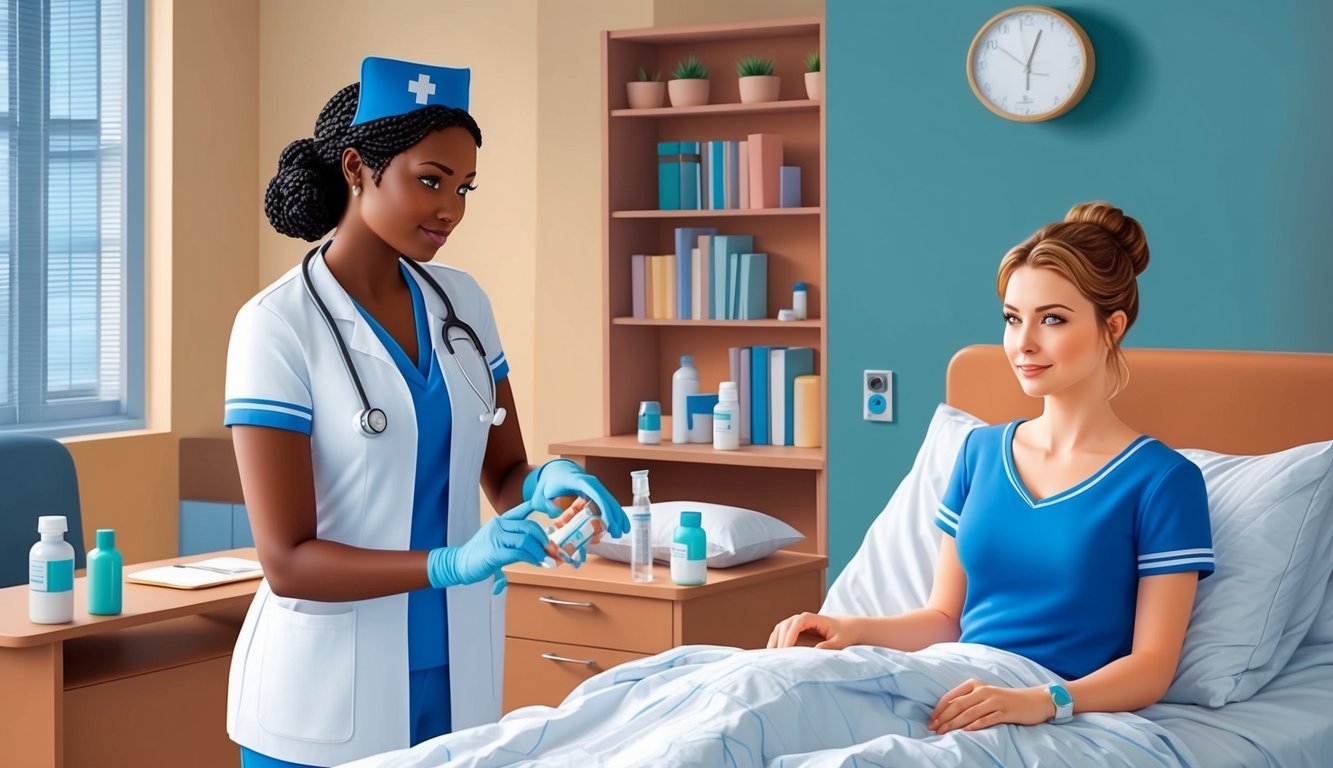Becoming a psychiatric nurse is a rewarding journey that plays a vital role in mental health care.
Typically, the process takes around 10 years from starting your undergraduate education to completing an advanced practice degree.
This timeline encompasses obtaining a Bachelor of Science in Nursing (BSN), gaining registered nurse (RN) licensure, and pursuing further specialization.
The need for skilled psychiatric nurses is growing, as mental health awareness rises and the demand for care increases.
Opportunities exist throughout various healthcare settings, including hospitals, clinics, and community health organizations.
Understanding the requirements and time commitment involved can help you navigate this path more effectively.
If you’re passionate about mental health and wish to make a significant impact in the lives of individuals struggling with mental illness, pursuing a career in psychiatric nursing may be the right choice for you.
With the appropriate education and training, you can become a crucial part of the mental health care system.
For further details about becoming a psychiatric nurse, refer to resources like Nurse.org and RegisteredNursing.org.
Educational Pathways

Becoming a psychiatric nurse involves several educational pathways.
Understanding these paths will help you choose the one that aligns best with your career goals.
The journey typically begins with an undergraduate nursing program, followed by options for graduate education and specialization.
Undergraduate Nursing Programs
You can pursue a Bachelor of Science in Nursing (BSN) or an Associate Degree in Nursing (ADN) as your first step.
| Program Type | Duration | Degree Level |
|---|---|---|
| BSN | 4 years | Bachelor’s |
| ADN | 2-3 years | Associate |
A BSN provides a comprehensive education, including advanced nursing practices and critical thinking skills.
An ADN is a quicker route but may limit career advancement opportunities.
Post-graduation, you must pass the NCLEX-RN to become a licensed registered nurse.
Resources like Nurse.org offer guidance on selecting a program.
Graduate Nursing Education
After your initial nursing education, pursuing advanced degrees can enhance your qualifications.
| Program Type | Duration | Degree Level |
|---|---|---|
| Master’s of Science in Nursing (MSN) | 1-2 years | Master’s |
| Doctor of Nursing Practice (DNP) | 3-4 years | Doctorate |
An MSN program often includes options for specialization, like psychiatric nursing.
If you already hold a BSN, consider a BSN-to-MSN bridge program.
Alternatively, an RN-to-MSN program is available for those with an ADN.
Institutions such as Nursing Education provide detailed information on graduate pathways.
Continuing Education and Specialization
To excel as a psychiatric nurse, ongoing education is vital.
This can involve obtaining certifications or pursuing additional training.
- Certification in Psychiatric-Mental Health Nursing: Offered by organizations like the American Nurses Credentialing Center (ANCC).
- Specialized courses: Focus on advanced therapeutic practices and psychiatric disorders.
Many states require continuing education to maintain licensure.
Engaging in further studies not only deepens your expertise but also prepares you for higher positions, such as program directors or clinical leads.
For more details on certification, you can visit Registered Nursing.
Licensure and Certification

To become a psychiatric nurse, you must navigate various licensure and certification processes.
These steps establish your qualifications to provide care in the psychiatric field and ensure that you meet the standards set by regulatory bodies.
Initial RN Licensure
The first step toward becoming a psychiatric nurse is obtaining your Registered Nurse (RN) license.
This requires graduating from an accredited nursing program, which may include an Associate Degree in Nursing (ADN), Bachelor of Science in Nursing (BSN), or a diploma program.
Once you complete your education, you must pass the National Council Licensure Examination for Registered Nurses (NCLEX-RN).
This exam assesses your knowledge and skills necessary for entry-level nursing practice.
After passing, you can apply for your state license, which permits you to practice nursing in your state.
Advanced Practice Registered Nurse Licensure
If you plan to further your career as a Psychiatric Mental Health Nurse Practitioner (PMHNP), you will need to obtain Advanced Practice Registered Nurse (APRN) licensure.
This generally requires holding a master’s or doctoral degree in psychiatric-mental health nursing.
You will also need to complete a specific number of supervised clinical hours.
After meeting these educational and clinical prerequisites, you can sit for the PMHNP certification exam.
Successfully passing this examination allows you to practice as an advanced nurse in the psychiatric field.
Specialty Certification in Psychiatric Nursing
For those focused on psychiatric nursing, obtaining the Psychiatric-Mental Health Nursing Certification (PMH-BC) may be beneficial.
This certification, offered by the American Nurses Credentialing Center, demonstrates your expertise in mental health nursing.
To qualify, you need to be a licensed RN and meet specific clinical practice requirements.
You will also need to pass the PMH-BC examination.
Achieving this certification not only enhances your credentials but also improves job opportunities and earning potential in psychiatric nursing.
Clinical Experience and Skills Development

Gaining practical experience and developing specialized skills is crucial for becoming an effective psychiatric nurse.
Focused hands-on training in mental health settings enhances your ability to offer compassionate care while navigating the complexities of patient needs.
Gaining Experience in Mental Health Settings
To thrive in psychiatric nursing, seek clinical placements in various mental health environments.
This may include hospitals, outpatient clinics, and community health organizations.
Through such experiences, you will interact with patients facing diverse mental health conditions, enabling you to apply theories in real-world scenarios.
Many nursing programs require clinical rotations in mental health, allowing you to gain direct exposure.
You will develop strong communication skills and learn to recognize behavioral problems, which are vital for patient care.
Collaboration with interdisciplinary teams also reinforces your understanding of holistic healthcare.
Developing Specialized Skills
As you gain experience, focus on developing specialized skills critical for psychiatric nursing.
Your ability to demonstrate empathy and compassion will foster trusting relationships with patients, enhancing their comfort levels during treatment.
Moreover, cultivating critical thinking skills is essential for assessing patient needs and prioritizing care effectively.
You will also learn various therapeutic communication techniques, which are vital for effective interaction in mental health settings.
Consider pursuing a psychiatric nursing certification to establish your expertise in the field.
Certifications often focus on advanced skills and knowledge, preparing you for more complex patient scenarios.
Professional Development Through Experience
Engaging in continuous professional development through your clinical experience enhances your competencies.
Attend workshops, conferences, and training sessions related to mental healthcare to stay current with best practices.
Additionally, seek mentorship from experienced psychiatric nurses.
Their insights can provide you with valuable perspectives on patient care and professional growth.
Document your experiences thoroughly.
Reflecting on your interactions with patients helps refine your approach, deepening your understanding of mental health nursing.
This ongoing development ensures you become an effective advocate for your patients and a knowledgeable member of the healthcare team.
Career Opportunities and Settings

Psychiatric nurses have diverse career opportunities across various healthcare settings.
Understanding where these professionals work can help you choose the right path for your nursing career.
Hospitals and Inpatient Facilities
In hospitals and inpatient facilities, psychiatric nurses provide critical care to individuals facing acute mental health crises.
You will work within specialized psychiatric units, collaborating closely with psychiatrists, social workers, and other healthcare providers.
This environment emphasizes stabilization through medication management and therapeutic interventions.
Some key responsibilities include:
- Conducting mental health assessments
- Monitoring patients for safety risks
- Implementing treatment plans and interventions
Working in hospitals offers exposure to a variety of mental health disorders, enhancing your experience.
For those aiming to become a psychiatric nurse practitioner, this setting can be an excellent foundation.
Outpatient and Community Mental Health
Outpatient settings and community health centers focus on providing accessible mental health services.
Here, you might work with patients who require support but do not need hospitalization.
You will be involved in ongoing treatment, including therapy and medication management.
Key aspects of this role include:
- Educating patients about mental health management
- Coordinating care with community resources
- Offering support in lifestyle changes and coping strategies
Your role in community mental health is vital, as it helps reduce stigma and promotes mental wellness.
Many private psychiatric practices also operate on an outpatient basis, allowing for personalized care.
Correctional Facilities and Special Populations
Working as a psychiatric nurse in correctional facilities involves addressing the mental health needs of inmates.
This environment requires specialized skills, as you will deal with unique challenges and populations experiencing significant mental health issues, often complicated by substance abuse.
Significant responsibilities might include:
- Conducting assessments to determine mental health needs
- Implementing treatment plans tailored to inmates
- Facilitating group therapy sessions
Your expertise in mental health services will contribute to rehabilitation and managing crises in a challenging environment.
Facilities may also have special programs aimed at treating veterans or youth, offering varied experiences in your nursing career.
Roles and Responsibilities

As a psychiatric nurse, you engage in critical tasks that encompass patient care, treatment planning, and collaboration with other healthcare professionals.
Your role is vital in ensuring comprehensive mental health treatment and effective crisis intervention.
Clinical Duties and Patient Care
In your role, you conduct psychiatric assessments to evaluate patients’ mental health status.
This often involves collecting medical histories, observing behaviors, and diagnosing mental health conditions.
You offer direct patient care, which may include administering medications and monitoring their effects.
You are also responsible for providing psychotherapy, utilizing techniques tailored to individual patient needs.
This can include cognitive-behavioral therapy or supportive therapy.
Your focus is on building trust with patients, which is essential for effective communication and treatment adherence.
Developing and Implementing Treatment Plans
Creating effective treatment plans is a fundamental part of your responsibilities.
You collaborate with patients to develop care plans that address their unique mental health needs.
These plans typically include goals, therapeutic interventions, and schedules for follow-up assessments.
You are responsible for reviewing and adjusting these plans as needed, based on patients’ progress.
This can involve utilizing evidence-based strategies and incorporating feedback from both patients and interdisciplinary team members.
When necessary, you may also refer patients to specialized services or interventions.
Interdisciplinary Collaboration
In your role, you must collaborate with other healthcare professionals.
You work alongside psychiatrists, social workers, and other nurses to coordinate holistic care for patients.
This partnership helps to provide comprehensive treatment that covers all aspects of a patient’s well-being.
Regular team meetings allow you to share insights and make collective decisions regarding patient care.
You may also participate in crisis intervention teamwork.
Here, your observations and input can significantly influence treatment outcomes.
Your communication skills play a key role in ensuring all team members are aligned in their approach to care.
In this interconnected healthcare environment, your ability to engage effectively with diverse professionals enhances the quality of mental health services provided to patients.

